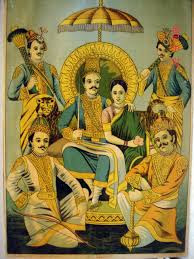After Arjuna’s return to Indraprasta, Krishna along with Balarama, his other relatives and
men like Akrura, Anadhrishti, Udhdhava, Vrishapati, Satyaka, Salyaki,
Kritavarma, Satwata, Pradhyumna, Samva, Nisatha, Sanku, Charudeshna, Jhilli,
Viprithu, Sarana and Gada, came to see him.
Yudhishtira sent Nakula and Sahadeva to receive Krishna and his men, who were given a majestic reception. Krishna, gratified by the warm reception, saluted
Yudhishtira and Bhima.
Krishna presented many gifts to Arjuna and Subhadra.
The Yadavas and the Kurus spent a lot of time together.
In course of time, Subhadra gave birth to a son who came to be called
Abhimanyu. Yudhishtira celebrated the birth of Abhimanyu by gifting cows and
gold coins to Brahmins and other people.
Krishna performed the appropriate rites ordained to be performed by
the maternal uncle.
As Abhimanyu grew up, he became conversant with the Vedas. He
learnt the art of weapons from his father. Like his father, Abhimanyu became
proficient both in the use of weapons and in the knowledge of scriptures and religious rites. Arjuna was very
happy at his son’s progress.
Draupadi gave birth to five sons through each of her
husbands. Yudhishtira’s son was called Prativindhya, since he was strong like
the Vindhya mountains. Bhima’s son was called Sutasoma, since he was born after
Bhima had performed a thousand Soma sacrifices. Since Arjuna’s son was born after Arjuna had returned from his exile
after performing many feats, he was called Srutakarma. Nakula named his son Satanika after a royal
sage in the illustrious race of Kuru. Since Sahadeva’s son was born under the constellation Vahni-daivata (Krittika), he was called Srutasena
(Kartikeya).
The sons of Draupadi were born at the interval of one year
each. All of them became renowned and very much attached to one another. Their rites of infancy such as Chudakarana (first shave
of the head) and Upanayana (investiture with the sacred threads) were performed by Sage Dhaumya
.
All of them, after studying the Vedas, acquired the knowledge of the weapons
from Arjuna. The Pandavas were elated when
their sons, who were equal in glory to
the sons of the celestials, became accomplished warriors.
The Pandavas brought many kings under their rule. People
were happy under Yudhishtira’s rule. Yudhishtira studied the Vedas, performed
sacrifices and protected the people. He combined virtue, pleasure and profit judiciously.
Because of Yudhishtirs’s influence, other kings on the earth
also became aligned to virtue and they became inclined towards meditation on
the Supreme spirit.
Assisted by his four brothers, Yudhishtira shone like a
sacrifice assisted by the four Vedas. Many Brahmins waited upon Yudhishtira like
the celestial waiting upon the Lord of the creation. People were delighted to look at Yudhishtira,
who was like the full moon without a stain.
People developed an affection towards Yudhishtira who never uttered anything
that was improper, untrue, unbearable or disagreeable. Yudhishtira, endowed with great energy, and aided by his brothers took
care of his people and lived happily with no enemy to disturb his peace.
Next: Adi Parva-50. Agni seeks Arjuna's help
Previous: Adi Parva-48. Arjuna Weds Subhadra
Next: Adi Parva-50. Agni seeks Arjuna's help
Previous: Adi Parva-48. Arjuna Weds Subhadra




No comments:
Post a Comment